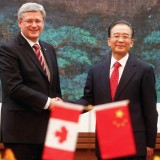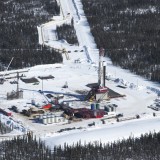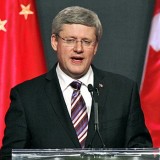My colleague, Damien Gillis, has been doing some superb work on “fracking” and I enter the discussion with considerable temerity. He is, after all, the brains and filmmaker of the organization and I the mere mouth.
It has seemed to me that we are moving – indeed may have already moved – away from the time when we were all opposed to fossil fuels in any form. The provincial government, for example, supported the so-called “run of river” (better described as “ruin of river”) projects by dumping all over using natural gas for power, even for the Burrard Thermal Plant, which is occasionally used by BC Hydro to shore up power in low water and extreme demand conditions.
In a breathtaking turnaround, Premier Clark has decided that when natural gas power is used to concentrate natural gas into a liquefied form it is no longer a nasty old fossil fuel.
Now, as if a magic wand had been waved, gas from fracking – extracting it from shale rock by using highly powered water pumps, laced with highly toxic chemicals – is a wonderful idea.
To the utter disbelief of many, NDP energy critic John Horgan agrees!
This seems to me to be the classic way we do things – accept big business policy, let them get it firmly in place, organizing delivery to export sites to deliver to offshore customers, then hesitantly ask questions.
The Liberals I can understand. They run all policy by the Fraser Institute then its huckelty buck and away they go!
The environment only matters if it costs votes and it’s here the Clark government are acting on the correct assumption that the NDP doesn’t ask questions for they fear the taunt, “are you against everything?” This causes an immediate retreat into the coward’s corner such that they abandon their duty to hold government’s feet to the fire.
Let me pose two questions to the NDP.
Given the abundance of shale gas all around the world, is there not a real risk that the price of gas won’t permit us to export at a profit? Largely due to this recent glut of shale gas, natural gas prices are down and predicted to go lower. Under this regime, how can any government support such idiocy?
I’ll give you a hint, Mr. Dix and Mr. Horgan, of what you’ll see in the 2013 BC budget – hundreds of millions of dollars counted as tax receipts from thus enhanced gas industry. That will get Premier Photo–Op just what she needs for the election – the promise of huge revenues permitting them to balance their budget. Money on the come that will never come, just like the 2009 Liberal Budget which came in a little short…like $2 BILLION short.
To put it bluntly, they will project income that won’t materialize and like Charlie Brown and Lucy with the football – you never learn – you’re about to play the same game again! Moreover, you’re scared to ask the important questions for fear of being cast as “anti-business” or “anti-progress”.
Now don’t tell us that industry isn’t dumb enough to make huge investments when faced by huge losses. They can be and often are damned fools, pushed on by the momentum of old decisions they dare not abandon but, like Mr. Micawber, hope that “something will turn up”…Just like it did for the auto industry in 2011 when the government bailed them out.
Unfashionable though it seems to be in NDP circles these days, shouldn’t the Opposition be worried about environmental and safety concerns?
LNG has a good safety record except that when they have a problem it’s a huge one! Shouldn’t the good burghers of Prince Rupert and Kitimat have the NDP (forget the governments) and the Green Party be able to assure them that LNG plants in their midst is a safe plan? Can the NDP and Greens give that support? If they can, how come they were so against the proposed LNG plant in Texada Island a few years ago? Have things changed? Is it possible that the only thing that has changed is that the NDP might become government as long as they play their cards very carefully?
On the question of natural gas pipelines, is the NDP saying that no concerns should be raised, even though some local First Nations are starting to raise hell?
Rather than look at fracking not just as an environmental matter, what about safety?
Is there an increased chance of earthquakes? Obviously, if you dig a tunnel, you can be pretty sure it will eventually collapse – the casing for these bore holes can’t last forever. What impacts can this have?
And what about the water, contaminated with chemicals? Where does it go? Into the water table? Into our drinking water? Tell us, Mr. Dix and Mr. Horgan, again (I won’t trouble governments since they couldn’t care less), are you satisfied with corporate assurances on this matter? Why would they be any more caring on this issue than they are on others?
Now the environment.
How much fossil fuel will be burned as the energy to capture the fossil fuel from the fracking process? Yes, we will use energy to extract energy which we will then use more energy for to send it to customers! If we are afraid of the impact on the environment of the Burrard Thermal Plant, surely we must be very worried indeed about burning gas to mine gas and process.
Is Site C not now going to be used to create power so that industry can use that at a very cheap price to get at the fracked gas? Doesn’t this mean that we will flood more land to sell power cheaply to those who will use this cheap energy to turn into profits from the fossil fuels extracted by fracking?
Come to think of it, Mr. Dix and Mr. Horgan, let me pose the following propositions, not saying they are accurate but putting the onus on you and your corporate friends to show me I’m wrong. Let’s use the precautionary principle here:
1. Liquified natural gas (LNG) is very dangerous in the liquification process, the moving process and simply in storage. Your comments?
2. There is relatively little revenue to the province under the very best of circumstances – If you agree, why are you supporting LNG and if you disagree, let’s have your figures.
3. The likelihood is that the worldwide price for natural gas is dropping and will continue to drop, which will bring pressure on governments to subsidize and indeed bail out gas companies as happened with the automobile industry. If you disagree, why? If you agree, are you prepared to spend BC taxes one more time to bail out industry?
4. There is evidence of fracking leads to gas and other chemicals getting into groundwater thence into domestic water. What evidence do you have to deny this?
5. There is clear evidence of fracking causing earthquakes – what do you say to this?
6. Cheap power from Site C will subsidize gas companies in the fracking process – what say you to that?
7 Because of Site C, millions of hectares of farmland and grazing land will be lost – why should the people of BC make this sacrifice so that you can mine gas?
Then, gentlemen, this question: If BC has this huge capacity to make money, why are we liquefying it and sending it abroad when we could have all this cheap power for here at home? To keep our domestic energy costs low and make our industries more competitive?
I and the readers of The Common Sense Canadian – indeed all British Columbians await in the hopes that as an opposition party hoping to win government, you will favour us with an early reply.
Or is it, God forbid, that winning the next election is more important than an informed citizenry?




